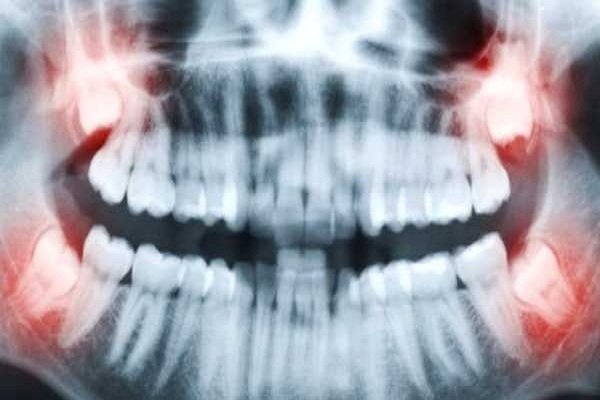Wisdom Tooth Removal Is Not Painful Any More
Our highly experience oral and maxilo-facial surgeons at Perfect Dental® in Jamnagar perform Wisdom Tooth Removal with utmost sensitivity and care


Wisdom teeth are the third set of molars which erupt in your mouth during late teens or early twenties. Most commonly wisdom teeth erupt between the age of 21-23 years. As long as these teeth erupt straight, they do not cause any problem or discomfort. However if these teeth erupt sideways, partially or remain trapped within the gums, they may cause lot of complications and may require surgical intervention.
When wisdom tooth fails to erupt or push through into the mouth, it is referred to as impacted wisdom tooth. It can be either fully enclosed beneath the gums or be partially exposed into the mouth. Since wisdom teeth are last to erupt, sometimes there may be inadequate amount of space for them to erupt into the mouth. This results in development of tilted, angled or crooked wisdom tooth, which if not removed can be troublesome in the long run. Impacted wisdom tooth may crowd other teeth and may cause pain, swelling around jaw, red or swollen gums, tender or bleeding gums, jaw pain, bad breath, unpleasant taste in mouth or difficulty opening mouth. Sometimes they may also cause infections and lead to the development of cysts and tumours. Incompletely erupted teeth can lead to pocket formation where food, bacterial plaque and calculus tend to collect. This results in the cavity formation which may spread to the neighbouring teeth and cause their decay. Moreover, wisdom teeth which do not erupt may move in the direction of the adjacent tooth roots and thereby cause resorption by exerting pressure on them. Therefore it is imperative to get rid of wisdom teeth which do not erupt straight in the mouth.
At Perfect Dental® in Jamnagar, we have competent and highly skilled oral surgeons who are proficient in wisdom tooth extraction. Our team of dental professionals will thoroughly examine and evaluate the position and condition of your wisdom teeth through clinical examination and 2D or 3D X-rays, in order to determine the right treatment plan and safe surgery for you. The entire procedure of wisdom tooth removal is carried out under local anesthesia with hi-tech instrument in order to ensure a pain free and comfortable dental experience.
There is less need to make an incision in gum if the tooth has broken through the gum. You shouldn’t feel any pain as your wisdom teeth are removed because the area will be numb. However, if you do feel pain during the procedure, tell your dentist or oral surgeon so they can give you more anesthesia.
Although it is sometimes believed by patients that it might be necessary to “break the jaw” to remove difficult wisdom teeth, this is never the case. However, the lower jaw may be weakened for a period of weeks or occasionally months following removal of any deep wisdom tooth.
Most wisdom tooth extractions don’t result in long-term complications. Rare complications can include: Painful dry socket or exposure of bone when the post-surgical blood clot is lost from the site of the surgical wound (socket) Infection in the socket from bacteria or trapped food particles.
You should wait at least a week to eat any crunchy, chewy or spicy foods. Avoid acidic foods that can irritate tissue and cause pain in the healing surgical sites. Recovering from wisdom tooth surgery can take anywhere from a few days to a couple weeks but most people begin to feel better after about three days.
Even if all four wisdom teeth are free of infection and not causing pain or if only one tooth is problematic, Our best dentists or Oral Surgeons in Jamnagar at Perfect Dental® may still recommend they all be removed. This is the standard prophylactic protocol followed worldwide.
Of course, every case is different, some taking longer than others. Recognizing that often all 4 wisdom teeth are removed in one visit, it will usually take less than 1 hour for treatment to be completed, if the wisdom teeth were fully erupted.
This risk is present until you’re fully healed, which may take 7 to 10 days in many cases. Dry socket occurs when the blood clot that should have formed in the socket after your extraction is either accidentally removed or never formed in the first place. Dry socket is no longer a risk once the site is healed.
– Bleeding is profuse (choking on blood).
– Bleeding is continuous (still changing bright red gauze after 24 hours).
– Severe pain not well controlled by medications.
– Rash, hives or difficulty breathing after taking the medications that suggest an allergic reactions.
– Persistent fever lasting more than 24 hours.
– Discharge coming out from the surgical site.
– If a tooth was removed from the upper jaw and when you drink any fluid and it is coming out of nose.
Perfect Dental® is the best dental clinic in Jamnagar and our team of specialist doctors is highly skilled and experienced best dentists in Jamnagar. We have a highest success rate of 97%.